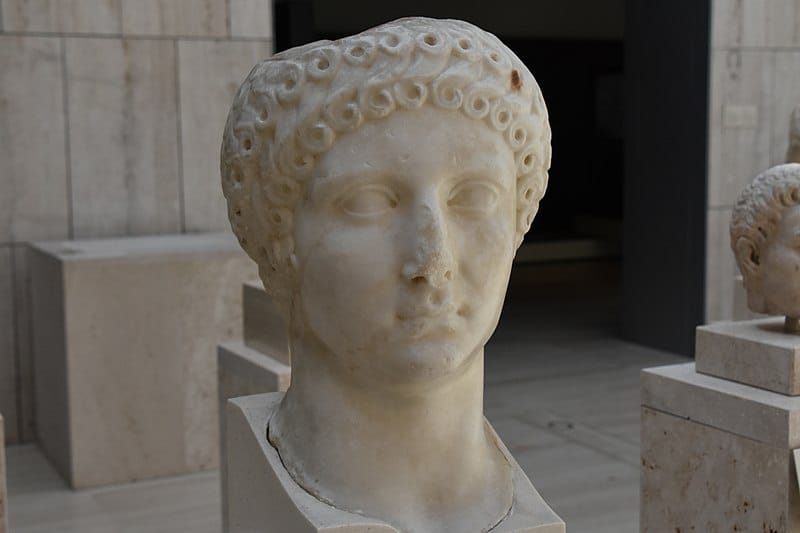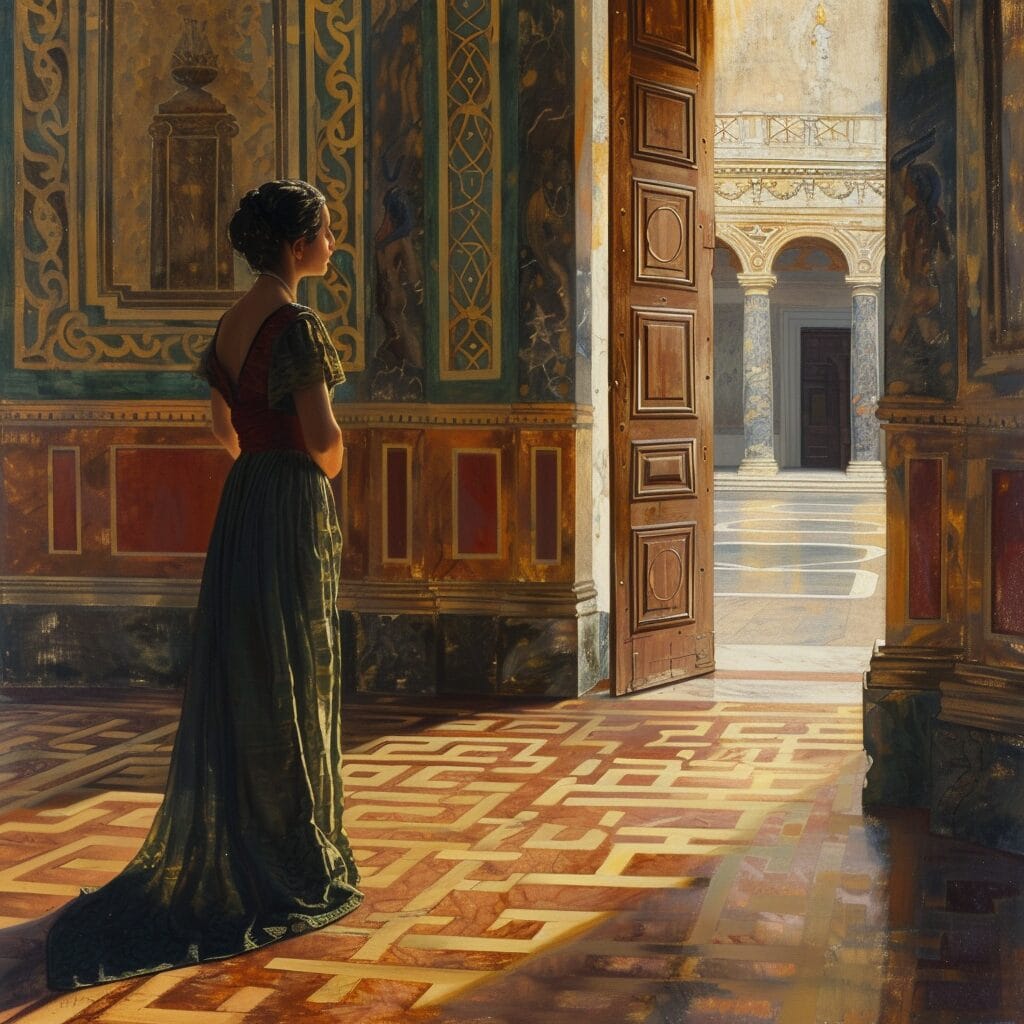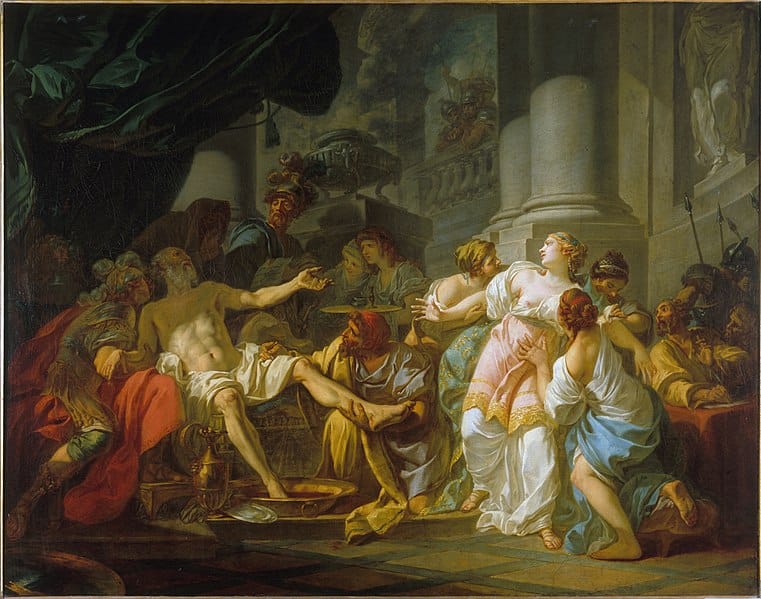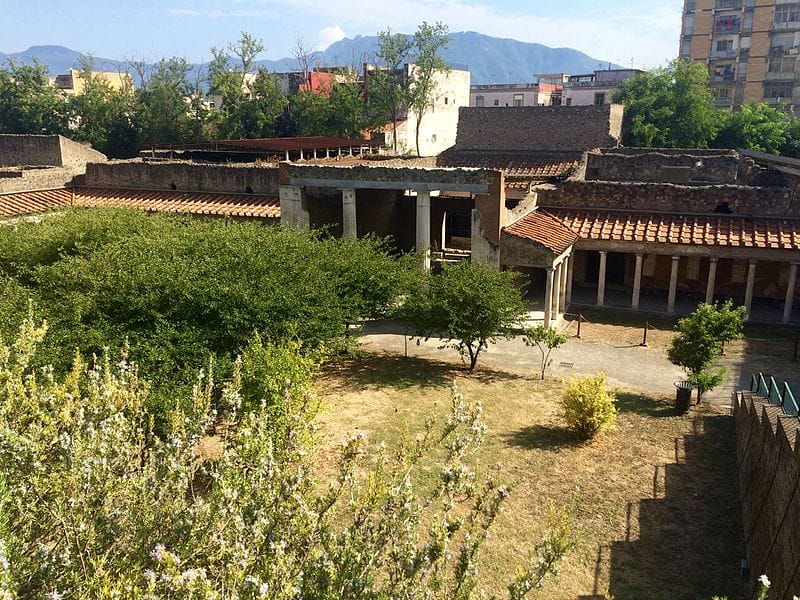Poppaea Sabina was a Roman Empress who lived during the first century AD. She is known for her beauty, ambition, and political influence during the reign of Emperor Nero. Poppaea was born into a wealthy family in Pompeii and grew up in Rome. She was educated in music, literature, and philosophy and was known for her wit and charm.
Poppaea’s rise to prominence began when she caught the eye of Emperor Nero, who was then married to his first wife, Claudia Octavia. Nero was infatuated with Poppaea and eventually divorced Octavia to marry her. Poppaea Sabina became Empress of Rome and used her position to advance her own interests and those of her family. She was known for her luxurious lifestyle and her patronage of the arts.

Source: Richard Mortel from Riyadh, Saudi Arabia, CC BY 2.0 https://creativecommons.org/licenses/by/2.0, via Wikimedia Commons
Despite her many accomplishments, Poppaea’s legacy is controversial. Some historians view her as a powerful and influential woman who played a key role in shaping the politics and culture of ancient Rome. Others see her as a ruthless and manipulative figure who uses her beauty and charm to gain power and influence. Regardless of one’s opinion of Poppaea, her life and legacy continue to fascinate scholars and historians to this day.
Key Takeaways
- Poppaea Sabina was a Roman Empress known for her beauty, ambition, and political influence during the reign of Emperor Nero.
- She rose to prominence after catching Nero’s eye and eventually became Empress of Rome. Poppaea’s legacy is controversial, with some viewing her as a powerful and influential woman and others as a ruthless and manipulative figure.
Early Life and Family
Birth and Ancestry
She was born in Pompeii, Italy, in the year 30 AD. She was born into a wealthy and influential family, with her father being a prominent Roman statesman and her mother being of noble birth. Poppaea’s family was well-connected in Roman society, with her father having close ties to Emperor Tiberius.
Poppaea’s ancestry can be traced back to the Julio-Claudian dynasty, as her great-grandfather was Emperor Augustus, and her grandmother was the sister of Emperor Caligula. This lineage gave Poppaea a strong connection to the Roman imperial family and a sense of entitlement.

Early Education and Upbringing
Poppaea was raised in a privileged environment and received an education that was typical of a Roman noblewoman. She was taught to read and write, as well as music, dance, and other cultural pursuits. Poppaea was also trained in the art of seduction, which was seen as an important skill for women of her social status.
Despite her privileged upbringing, Poppaea was not immune to tragedy. Her older sister died at a young age, and her father was exiled by the Emperor Tiberius for political reasons. These events may have contributed to Poppaea’s desire for power and influence, as well as her ambition to become a part of the Roman imperial family.
Her early life and family background played a significant role in shaping her character and ambitions. Her upbringing in a wealthy and influential family, combined with her connections to the Roman imperial family, gave her a sense of entitlement and a desire for power and influence.
Rise to Prominence
First Marriage
She was married to Rufrius Crispinus, a Roman senator, at a young age. However, the marriage was short-lived as Crispinus was accused of treason and executed by Emperor Nero.
Association with Nero
Following her first marriage, Poppaea became a mistress of Emperor Nero. She was known for her beauty and charm and quickly rose to prominence in Nero’s court. Poppaea was a skilled politician and used her influence to secure power and wealth for herself and her family.
Her relationship with Nero was turbulent, and she was often the subject of jealousy and intrigue among the other courtiers. Despite this, she remained a powerful figure in Nero’s court until her untimely death. Her rise to prominence was due to a combination of her family’s wealth and influence, her own political skills, and her relationship with Emperor Nero.

Empress of Rome
Marriage to Nero
She married Nero in 62 AD after he had already divorced his first wife, Claudia Octavia. Poppaea was known for her beauty and charm and was able to captivate Nero’s attention. Their marriage was initially kept secret due to the disapproval of Nero’s mother, Agrippina the Younger. However, after Agrippina’s death in 59 AD, Nero was free to marry Poppaea and openly declared her his wife.
Influence and Power
As Empress of Rome, Poppaea held significant influence over Nero. She was known for her political savvy and was able to influence Nero’s decisions. Poppaea was also involved in the arts and was a patron of various poets and musicians. She was known for her luxurious lifestyle and was said to have had a passion for fine jewelry and clothing.
Despite her influence, Poppaea’s reign as Empress was short-lived. She died in 65 AD after suffering complications from a miscarriage. Her death was a great loss to Nero, who was said to have been devastated by her passing. Overall, she was a significant figure in Roman history, known for her beauty, charm, and political influence.
Cultural and Historical Impact
Representation in Arts and Literature
Poppaea Sabina, the second wife of Emperor Nero, has been a subject of fascination for artists and writers throughout history. In art, she is often depicted as a beautiful and seductive woman, with a particular focus on her relationship with Nero. One famous example is the painting “The Death of Seneca” by Jacques-Louis David, which portrays Poppaea as a central figure in the scene.

In literature, Poppaea Sabina is often portrayed as a cunning and ambitious woman who uses her beauty and wit to manipulate Nero. One notable example is the play “Nero and Poppaea” by Samuel Daniel, which portrays their relationship as a destructive force that ultimately leads to Nero’s downfall.
Contemporary Accounts
Contemporary accounts of Poppaea Sabina paint a more complex picture of her character and influence. While some sources describe her as a ruthless and ambitious woman who was willing to do whatever it took to gain power, others suggest that she was a kind and compassionate person who used her influence to help others.
One of the most detailed accounts of Poppaea comes from the Roman historian Tacitus, who describes her as a woman of great beauty and intelligence who was deeply devoted to Nero. He also notes that she was involved in politics and had a significant influence on Nero’s decisions.
Death and Legacy
Circumstances of Death
The exact circumstances of her death are unclear, but it is believed that she died during childbirth. According to some accounts, Poppaea Sabina was kicked in the stomach by her husband, the Roman Emperor Nero, which led to her death. However, this claim is disputed by other historians.
Posthumous Reputation
Despite the controversy surrounding her life, Poppaea Sabina was remembered by some as a woman of great beauty and charm. She was also known for her intelligence and political acumen. Some historians have suggested that if she had lived longer, she may have been able to exert more influence over Nero and perhaps even prevent some of his more infamous actions.
In later years, she was often portrayed as a tragic figure, a victim of the excesses of Nero’s reign. Her story has been the inspiration for many novels, plays, and films, and her name continues to be remembered today.

Source: sébastien amiet;l, CC BY 2.0 https://creativecommons.org/licenses/by/2.0, via Wikimedia Commons
People Also Ask:
What were the circumstances surrounding the death of Poppaea Sabina?
Poppaea Sabina died in AD 65 at the age of 30. The exact circumstances of her death are somewhat unclear, but it is generally believed that she died as a result of complications from childbirth. According to some accounts, Nero, her husband, was so distraught by her death that he ordered her deification and built a temple in her honor.
What is known about Poppaea Sabina’s appearance and physical description?
There are few surviving descriptions of Poppaea Sabina’s appearance, but it is generally believed that she was a beautiful woman. She was described as having fair skin, blonde hair, and blue eyes. Some accounts suggest that she was also quite tall and had a graceful figure.
At what age did Nero marry Sporus, and what was their relationship?
Nero married Sporus, a young boy whom he had castrated and dressed as a woman, in AD 67. The exact nature of their relationship is unclear, but it is generally believed that Nero was deeply infatuated with Sporus and treated him as a wife. Some accounts suggest that Nero even went so far as to have Sporus declared Empress.
Who were the wives of Emperor Nero and what were their fates?
Nero had three wives during his reign. His first wife was Claudia Octavia, whom he divorced and later executed. His second wife was Poppaea Sabina, who died as a result of complications from childbirth. Nero’s third wife was Statilia Messalina, who survived Nero’s reign and went on to marry two other men.
How did Emperor Nero’s life come to an end?
Nero’s reign came to an end in AD 68 when he was declared a public enemy by the Senate and forced to flee Rome. He committed suicide the following year, after being captured by soldiers and declared a public enemy by the Senate.
What roles did Poppaea Sabina play in the cultural depictions of Nero’s reign in literature and film?
Poppaea Sabina has been depicted in a variety of ways in literature and film. In some works, she is portrayed as a scheming and manipulative woman who uses her beauty and charm to get what she wants. In others, she is depicted as a tragic figure who is caught up in the machinations of her husband’s court. Overall, Poppaea Sabina’s role in these depictions is often seen as emblematic of the excesses and corruption of Nero’s reign.
Hello, my name is Vladimir, and I am a part of the Roman-empire writing team.
I am a historian, and history is an integral part of my life.
To be honest, while I was in school, I didn’t like history so how did I end up studying it? Well, for that, I have to thank history-based strategy PC games. Thank you so much, Europa Universalis IV, and thank you, Medieval Total War.
Since games made me fall in love with history, I completed bachelor studies at Filozofski Fakultet Niš, a part of the University of Niš. My bachelor’s thesis was about Julis Caesar. Soon, I completed my master’s studies at the same university.
For years now, I have been working as a teacher in a local elementary school, but my passion for writing isn’t fulfilled, so I decided to pursue that ambition online. There were a few gigs, but most of them were not history-related.
Then I stumbled upon roman-empire.com, and now I am a part of something bigger. No, I am not a part of the ancient Roman Empire but of a creative writing team where I have the freedom to write about whatever I want. Yes, even about Star Wars. Stay tuned for that.
Anyway, I am better at writing about Rome than writing about me. But if you would like to contact me for any reason, you can do it at [email protected]. Except for negative reviews, of course. 😀
Kind regards,
Vladimir
